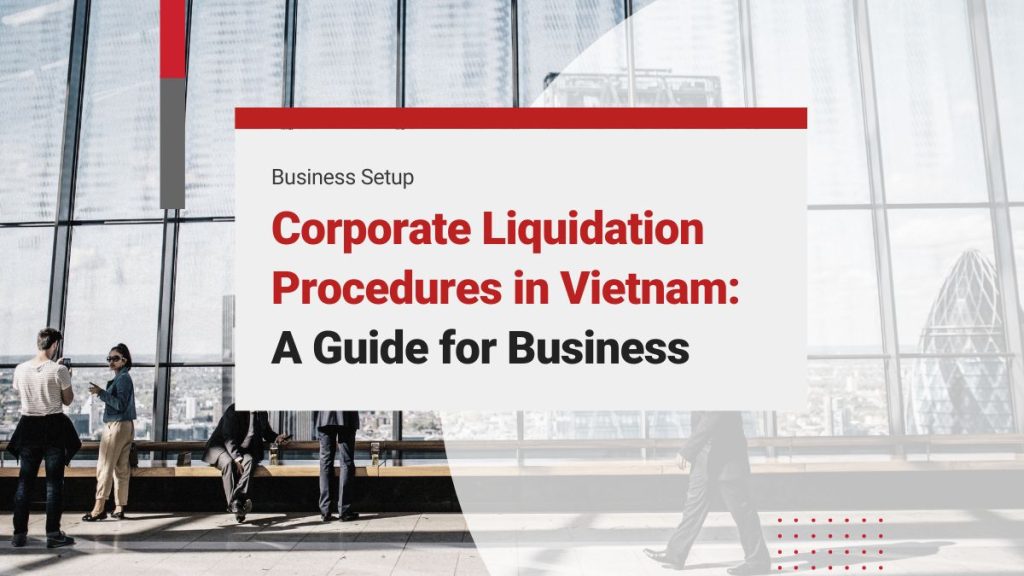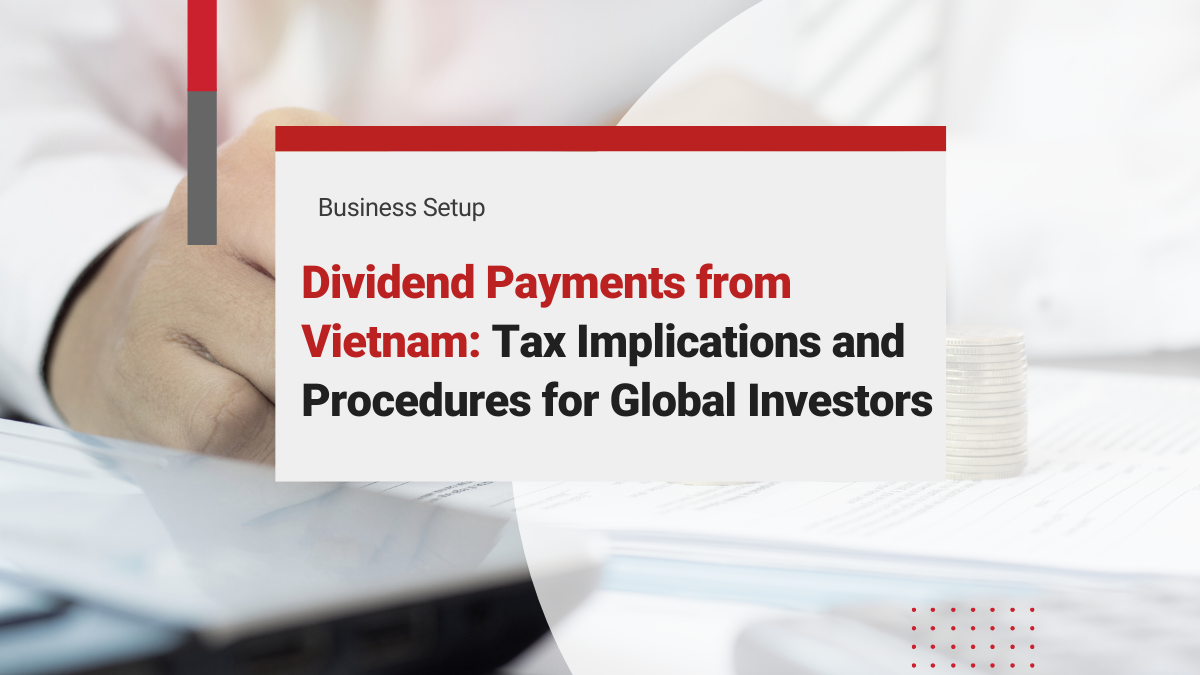Embarking on the journey of establishing a business in Vietnam is a thrilling prospect for entrepreneurs. However, the reality is that the road to success is fraught with challenges, and statistically, a significant number of startups globally face the harsh truth of failure. According to industry data, approximately 90% of startups do not survive the test of time.
Despite the allure of the Vietnamese economic landscape, where opportunities abound, starting a company is merely the first step. Recognizing the signs of potential challenges early on is a skill that can prove invaluable. In this article, we delve into the crucial aspects of the dissolution of a Limited Liability Company (LLC) in Vietnam. Understanding the indicators of a struggling business is pivotal for making informed decisions, and we explore these key signals to guide entrepreneurs through the dissolution process when necessary.
Is your company in trouble and wants to dissolve? Check out InCorp Vietnam’s Corporate Liquidation Services now!
What is the Dissolution of a Company?
Corporate liquidation is the formal process by which a business entity is removed or struck off from the Companies House register. This legal action signifies the cessation of trading activities, and the company ceases to exist as a distinct legal entity in the eyes of the law. The dissolution process can be triggered by various circumstances, with outcomes ranging from involuntary dissolution imposed by state administrators to voluntary dissolution initiated by business owners.
In cases of involuntary dissolution, state administrators overseeing business entities may force the dissolution due to several reasons. This can include a business’s failure to file annual reports, non-payment of certain taxes in the state of incorporation, or neglect to maintain a registered agent or registered office. Commonly known as administrative dissolution, this process is enforced by external authorities to address non-compliance issues and ensure the proper functioning of the business landscape.
On the other hand, voluntary dissolution is a proactive decision made by business owners to wind down their operations. This process involves the submission of Articles of Dissolution, a formal document that legally concludes the existence of the Limited Liability Company (LLC) or corporation. This legal action takes effect in the state of incorporation or formation, or the state of qualification if the business had registered to transact business in multiple states. Understanding the intricacies of corporate liquidation is crucial for business owners navigating the complexities of concluding their operations in a compliant and legally sound manner.
Indicators That Vietnam-Based Business Might Be Struggling
Operating a business in Vietnam presents a wealth of opportunities, but the path to success is laden with challenges. Discerning the signs of a struggling enterprise is essential for timely decision-making. Here are key indicators that your Vietnam-based business might be facing critical challenges.
- Low Revenues and Sales
The primary goal of establishing a business in Vietnam is to increase sales and generate profits. Consistently low sales and revenues over several months can be a glaring sign of impending failure. Struggling to identify effective strategies to boost these figures underscores the urgent need for a reassessment of the business’s viability.
- Delayed Bill Payments
The inability to meet financial obligations and pay bills on time can erode trust with vendors and jeopardize the continuity of operations in Vietnam. Beyond strained business relationships, delayed bill payments can lead to legal complications, posing a serious threat to the business’s stability and reputation.
- Lack of Competitive Edge
A lack of a competitive edge means the absence of a unique value proposition that sets your business apart from competitors. Without this differentiation, growth becomes stagnant, and sales suffer. Ensuring your business remains innovative and distinctive is crucial for long-term success in the competitive Vietnamese market.
- Insufficient Revenue to Cover Costs
When a business is no longer generating enough revenue to cover expenses, it reaches a critical juncture. Whether the financial decline is gradual or sudden, there comes a point where continued operation becomes economically unviable. Recognizing this financial strain is paramount for informed decision-making regarding the future of the business.
- Declining Demand for Products or Services
Even with adaptations and pivots, if your products or services are no longer in demand, it signals a fundamental shift in the market. This realization may be challenging, but acknowledging that the business landscape has moved away from your offerings is essential for making strategic decisions about the future of the enterprise.
- Burnout and Overwhelmed Operations
Feeling burnt out and overwhelmed by the demands of running a business is a personal indicator that often corresponds to broader operational challenges. Small businesses, particularly those run by a limited number of individuals, may find it increasingly difficult to sustain operations. Recognizing when the demands exceed available resources or energy is crucial for making the difficult decision to close shop and safeguard personal well-being.
Voluntary Dissolution vs. Involuntary Dissolution
The dissolution of a company can occur through two primary avenues: voluntarily or involuntarily. Each path is determined by distinct circumstances and decisions, shaping the future of the business in different ways.
- Voluntary Dissolution
Companies opt for voluntary dissolution for various reasons, typically stemming from a collective decision by the company’s shareholders that the business is no longer necessary or viable. This decision may arise when the business has reached its natural conclusion, or it could be a result of challenges preventing it from thriving. In some cases, businesses opt for voluntary dissolution due to a missed annual account deadline. Failing to meet this deadline incurs fines, starting at EU£150 and increasing based on the delay. Rather than dealing with ongoing filing fees and penalties, directors may choose to close the company. This is a legally permissible option sanctioned by Companies House, providing an alternative to navigating financial penalties associated with late filings.
- Involuntary Dissolution
In contrast, involuntary dissolution is initiated by Companies House if a company neglects its filing obligations, such as the confirmation statement, annual accounts, or company tax returns. Companies House acts as the regulatory body overseeing corporate entities and ensures compliance with legal requirements. Failure to meet these obligations prompts an involuntary dissolution, wherein the company is removed from the official register. This involuntary process is a consequence of the company’s failure to adhere to essential reporting and documentation requirements. It underscores the importance of timely and accurate filing to maintain a company’s legal standing and avoid potential legal repercussions.
When to Liquidate a Company Voluntarily in Vietnam: Some Conditions for Business
The voluntary dissolution of a company in Vietnam is a regulated process outlined in Article 207 of the Law on Enterprises 2020. To initiate the dissolution, specific conditions must be met, to ensure a lawful and orderly conclusion of the business. Here are the key conditions that warrant the voluntary dissolution of a company in Vietnam:
- Expiration of Operating Period
Voluntary dissolution is triggered when the operating period specified in the company’s charter expires without a decision to extend it. Once this predetermined period elapses, the company is obligated to undergo dissolution unless an extension decision is made.
- Resolution or Decision by Ownership Authorities
The voluntary dissolution process can be initiated by a resolution or decision of the relevant ownership authorities. The specific authority depends on the type of business entity:
– For sole proprietorships: By the owner;
– For partnerships: By the Board of Partners;
– For limited liability companies: By the Board of Members and the owner.
– For joint stock companies: By the General Meeting of Shareholders (GMS).
- Failure to Maintain an Adequate Number of Members
If the enterprise fails to maintain the minimum required number of members, as stipulated by the Law on Enterprises, for six consecutive months without transitioning to another business type, it becomes eligible for voluntary dissolution. This condition aims to ensure that businesses operate with a viable and sustainable structure.
- Revocation of Enterprise Registration Certificate
The enterprise may be dissolved if its Certificate of Enterprise Registration is revoked, following the provisions set by the Law on Tax Administration. This typically occurs due to non-compliance or violations of tax-related regulations.
- Other Condition
Additionally, before a company undergoes voluntary dissolution in Vietnam, certain prerequisites must be met. These include the full settlement of all debts and liabilities, as well as the absence of any ongoing disputes at the court or arbitration. It is imperative that relevant executives and the enterprise itself, particularly in the context of Certificate revocation, share joint responsibility for settling the company’s debts, ensuring a smooth and lawful dissolution process.
How to Dissolve a Company in Vietnam?
Step 1: Company Approval Dissolution Decision
The initial step in the voluntary dissolution process involves the company’s approval of a dissolution resolution or decision. This crucial document should encompass the following key information:
– Company’s name and headquarters address
– Reason for dissolution
– Time limit and procedures for finalizing contracts and settling the company’s debts; the payment term for debts and liquidation of contracts must not exceed six months
– Plan for settling obligations under employment contracts.
– Full name and signature of the owner of the private company, the owner of the company, the Chairman of the Board of Members, or the Chairman of the Board of Directors.
Step 2: Submission of Dissolution Documents to Competent State Agencies
Within 07 working days from the ratification date, the resolution or decision on dissolution and the meeting minutes should be sent to:
– Business registration authority.
– Tax authority.
– Company’s employees.
– The resolution or decision must be posted on the National Company Registration Portal and displayed at the company’s headquarters, branches, and representative offices. If there are unpaid debts, documents must be sent to creditors, including the resolution or decision and the debt payment plan.
Step 3: Implementation of Asset Liquidation
The company, depending on its structure, organizes the direct liquidation of assets. This step includes settling the company’s affairs unless the Company’s Charter stipulates the establishment of a separate liquidation organization.
Step 4: Procedure to Close the Company Tax Code
Depending on the company’s accounting practices, closing the tax code typically takes 06 months or more (excluding procedures for penalties, violations, and late submissions). During this process, the company reduces labor and settles relevant regimes for employees following the Labor Code.
Step 5: Return of the Company Seal (Round Sign)
The company’s seal, issued by the police department, needs to be returned. This involves following procedures to return the seal to the old police department.
Step 6: Submission of Returns Business Registration Certificate and Termination of Projects
Within five working days from the day the company’s debts are fully paid, the company’s legal representative applies for dissolution to the Business registration authority. This step involves terminating all investment projects if the company holds an investment registration certificate.
Are you still finding it challenging to prepare all the necessary documents? Contact us, and let InCorp Vietnam’s experts assist you.
Required Documentation for Corporate Liquidation Process
As stipulated in Article 210 of the Law on Enterprises 2020, the application for the dissolution of an enterprise in Vietnam necessitates the submission of specific documentation. Ensuring the completeness and accuracy of these documents is pivotal, and those entrusted with the application bear substantial legal responsibilities. The essential documentation comprises:
- Formal Notification of Enterprise Dissolution
An official notification detailing the enterprise’s decision to dissolve. This document serves as a primary acknowledgment of the company’s intent to cease operations.
- Comprehensive Report on Asset Liquidation
A detailed report outlining the liquidation process of the enterprise’s assets. This report should intricately describe how the assets are distributed or settled, ensuring transparency in the dissolution proceedings.
- Detailed List of Creditors and Settled Debts
An organized list of creditors accompanied by a record of debts that have been settled. This encompasses tax debts, social insurance, health insurance, and unemployment insurance of employees, if applicable. This section provides a transparent overview of the financial obligations addressed during the dissolution process.
The responsibility for the accuracy and truthfulness of the application lies with specific individuals based on the company’s structure:
– For joint-stock companies: Members of the Board of Directors.
– For limited liability companies: Members of the Board of Members.
– For sole proprietorships: The owner.
– For all entities: The Director/General Director, general partners, and legal representatives.
Expected Timeframe for Corporate Liquidation
Upon submission of the dissolution decision to the Department of Planning and Investment in Vietnam, the anticipated timeline for corporate liquidation is delineated. Following a 180-day comment period, during which the company or relevant parties can provide feedback or objections, the Department of Planning and Investment proceeds to the next stage provided no comments or objections are received. Within five working days post-comment period, the business registration authority swiftly updates the company’s status on the national company registration database.
Prohibited Actions from the Date of Dissolution Decision Issuance in Vietnam
In accordance with Article 211 of the Law on Enterprises 2020, from the issuance date of the dissolution decision in Vietnam, both the enterprise and its executives are explicitly prohibited from engaging in the following actions:
– Concealing or Disguising Assets;
– Denying or Reducing Creditors’ Claims;
– Transforming debts that were originally unsecured into debts secured with the enterprise’s assets;
– Concluding new contracts (except for Dissolution);
– Pledging, donating, leasing out assets;
– Termination of effective contracts;
– Raising capital in any form;
– Initiating efforts to secure additional capital through various means.
Any individuals found in violation of these prohibitions, depending on the nature and severity of the infractions, may face administrative penalties or criminal prosecution. Additionally, they may be held financially responsible for damages incurred as a result of these actions.
How Can InCorp Vietnam Help with Company Dissolution?
InCorp Vietnam is one of the leading companies with wide experience in business consultancy and company dissolution in Vietnam.
We have helped a lot of businesses in Vietnam in the past, guiding business owners step-by-step with the company’s dissolution process. We are a legally registered firm with the company dissolution process regulated by Vietnamese laws and authorities.
The dissolution and liquidation of a company can be very lengthy and complicated, especially when it comes to the paperwork and procedure. However, our legal consultant at InCorp Vietnam can deregister or dissolve your company smoothly and efficiently, which saves you time and resources.
To start the process of company dissolution in Vietnam, contact us via the form below.

clients worldwide

professional staff

incorporated entities in 10 years

compliance transactions yearly
Learn the Right Setup for Business
Expansion in the Vietnam
Frequently Asked Questions
What does a company liquidation mean?
- Company liquidation is the formal process of closing a business and distributing its assets to creditors and shareholders. In Vietnam, this involves settling outstanding debts, terminating labor contracts, paying taxes, and deregistering the business with relevant authorities, including the Department of Planning and Investment and the tax department.
What happens when a corporation liquidates?
- When a corporation liquidates in Vietnam, it officially ceases operations and settles its obligations by selling assets, paying off creditors, and distributing any remaining funds to shareholders. The liquidation process involves notifying authorities, closing tax obligations with the tax office, deregistering with the Department of Planning and Investment (DPI), and completing administrative procedures such as labor termination and bank account closure.
What is a corporate liquidation?
- Corporate liquidation is the formal process of closing a company and distributing its assets to creditors and shareholders. It involves settling outstanding debts, selling company assets, terminating contracts, and deregistering the business with relevant authorities. In Vietnam, liquidation must comply with the Enterprise Law and involve notifying tax and business registration agencies.






